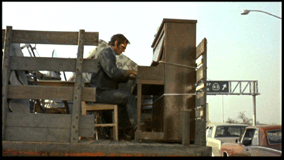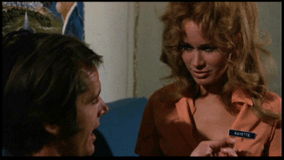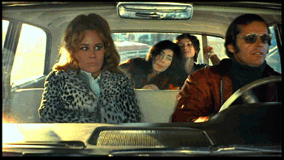Five Easy Pieces (Bob Rafelson) 1970
 Iíd be tempted to call Five Easy Pieces, with its
myriad scenes of familial reconciliation and wishy-washy male protagonist, a
chick flick for guys, but there arenít many chick flicks that are this
carefully observed and finely tuned. Featuring a top-notch performance by Jack
Nicholson, as Bobby, a man who canít commit to much of anything out of fear of
failure, the movie is subdued and intimate, even by Ď70s standards. As Five
Easy Pieces begins, we find Bobby working as an oil rigger and living in a
trailer park, but in his obvious dissatisfaction with the disappointments of his
life, we start to imagine that thereís more than meets the eye to him. Itís
no surprise then, when the frustrations of a traffic jam push him over the edge
and set him on a personal odyssey that forces him to revisit his past and
confront his demons.
Iíd be tempted to call Five Easy Pieces, with its
myriad scenes of familial reconciliation and wishy-washy male protagonist, a
chick flick for guys, but there arenít many chick flicks that are this
carefully observed and finely tuned. Featuring a top-notch performance by Jack
Nicholson, as Bobby, a man who canít commit to much of anything out of fear of
failure, the movie is subdued and intimate, even by Ď70s standards. As Five
Easy Pieces begins, we find Bobby working as an oil rigger and living in a
trailer park, but in his obvious dissatisfaction with the disappointments of his
life, we start to imagine that thereís more than meets the eye to him. Itís
no surprise then, when the frustrations of a traffic jam push him over the edge
and set him on a personal odyssey that forces him to revisit his past and
confront his demons.
 Itís to Five Easy Piecesí credit that it lets us
see Bobby in the context that it does at the start of the movie before it begins
to explain his behavior, and itís probably an even bigger achievement that it
doesnít neatly wrap him up for our safe consumption by the end of the film.
Bobbyís a drifter that occasionally settles down for a while, and he forces
those that he meets to learn that in order to love him, they have to be willing
to accept the fact that he might not always be there. Heís a coward underneath
his brazen exterior, and itís his desperate attempts to hide that from the
outside world that that make him endearing. Karen Blackís performance as Ray,
his girlfriend, is so affecting mostly because sheís not bright enough to see
through this faÁade, and, as such, she canít articulate her dissatisfaction
with him. Initially, it might seem
as if Nicholson is demonstrating only one emotion per scene, but by the
pictureís end, it becomes apparent that there was always a dislocation of self
underneath his grandstanding. His outbursts all hint at a deeper, very real,
sense of alienated hurt.
Itís to Five Easy Piecesí credit that it lets us
see Bobby in the context that it does at the start of the movie before it begins
to explain his behavior, and itís probably an even bigger achievement that it
doesnít neatly wrap him up for our safe consumption by the end of the film.
Bobbyís a drifter that occasionally settles down for a while, and he forces
those that he meets to learn that in order to love him, they have to be willing
to accept the fact that he might not always be there. Heís a coward underneath
his brazen exterior, and itís his desperate attempts to hide that from the
outside world that that make him endearing. Karen Blackís performance as Ray,
his girlfriend, is so affecting mostly because sheís not bright enough to see
through this faÁade, and, as such, she canít articulate her dissatisfaction
with him. Initially, it might seem
as if Nicholson is demonstrating only one emotion per scene, but by the
pictureís end, it becomes apparent that there was always a dislocation of self
underneath his grandstanding. His outbursts all hint at a deeper, very real,
sense of alienated hurt.
 The movieís slightly grainy look captures the nostalgic
feel of the film, and Rafelsonís direction is so unobtrusive that we barely
notice his occasional tracking shots and arty compositions. Thereís a stunning
amount of humor and heartbreak contained in Five Easy Pieces, which often
seems endless in the possibilities of its human observation. Helena Kallianiotes
has an unforgettable comic turn as a filth-obsessed, lesbian, hippie hitchhiker.
Susan Anspach and Lois Smith are nearly as good in roles that are much more
serious. Since the movie refuses to choose sides between Bobbyís past and
present, it becomes far more rewarding than it would have been if it found
something to blame for him turning out the way he did. This is surprising, since
all along the movie felt as if it were meandering toward a great, universal
truth. At its end, though, Five Easy Pieces hasnít given the audience
many definitive answers, but in leaving things unanswered, it tells us more
about Bobby, and ourselves, than anything definitive could.
The movieís slightly grainy look captures the nostalgic
feel of the film, and Rafelsonís direction is so unobtrusive that we barely
notice his occasional tracking shots and arty compositions. Thereís a stunning
amount of humor and heartbreak contained in Five Easy Pieces, which often
seems endless in the possibilities of its human observation. Helena Kallianiotes
has an unforgettable comic turn as a filth-obsessed, lesbian, hippie hitchhiker.
Susan Anspach and Lois Smith are nearly as good in roles that are much more
serious. Since the movie refuses to choose sides between Bobbyís past and
present, it becomes far more rewarding than it would have been if it found
something to blame for him turning out the way he did. This is surprising, since
all along the movie felt as if it were meandering toward a great, universal
truth. At its end, though, Five Easy Pieces hasnít given the audience
many definitive answers, but in leaving things unanswered, it tells us more
about Bobby, and ourselves, than anything definitive could.
* * * * Masterpiece
06-09-02
Jeremy Heilman